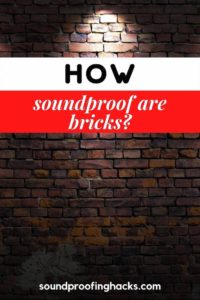I have to tell you, I really enjoy becoming the go to guy in my group when it comes to basic home improvement projects, especially those that relate to soundproofing. It feels like all the hard work I put in to upgrading and improving my home has made me a semi-guru of sorts, and I’m glad I can pass that knowledge on.
So just the other day we were having coffee and shooting the breeze when a discussion among 2 of the guys turned somewhat more serious. I poked my head in and found out they were talking about their new homes.

One of them had built a new place, which was mostly constructed from brick, while the other moved into an apartment downtown, which obviously was made with concrete. They were trying to figure out which of their homes were better in terms of soundproofing. Well, boys will be boys, the stupid things we talk about and compete on.
I did share my experience, but that also made me want to write this post and discuss a bit more about some usual materials found in our homes and whether they had soundproofing qualities or not.
Let’s dive in.
How soundproof is brick?
As we know, bricks are thick and dense.
These properties, however, contradict the popular belief. They are the very reason that bricks are not much sound insulating. Might come as a surprise to many, but let me explain.
You can be assured of a bit less sound transmission to another room but bricks do not absorb sound. They can absorb a little low frequency sound (such as bass, unloading of a truck, thunder) and reflect back all the high frequency sounds(such as chirping of birds, a whistle).
A classic 4 inch brick is found to have a Sound Transmission Class (the extent to which the wall can be expected to reduce noise) of 45. This is fairly better than a drywall.
You can use acoustic tiles and furniture for further noise reduction. However, you can’t do much about the echo. Covering the walls with pads or cloths doesn’t help much due to the high density of the bricks.
At most, you can try installing a soundproofing panel, or better yet, make your own acoustic panels!
There are also some soundproof bricks available nowadays with sound and thermal insulation which you can go for, if it suits your budget.
Loud noises from nearby roads can become an issue for houses too, so you might want to consider building an acoustic fence too.
How soundproof is concrete?
It is highly unlikely that you’ve never seen a concrete wall around you because it is the most widely used building material.
Concrete is rigid and dense.
Often, the rigidity of concrete ends up being a source of impact noise (noise produced by striking two bodies) and it also provides a continuous medium for sound to travel.
Yet, concrete can block air borne sounds from traveling through the wall.
Concretes are also of different types, mainly dense concrete and light concrete. Dense concrete lessens the noise level within a room but it transmits the sound to the other side of the wall.
In light concrete, noise level within the room won’t be changed but there would be no transmission of sound.
The STC rating of a solid 10 inch thick concrete wall can be up to 60. Dense concrete has a higher STC rating than light concrete.
If the walls are still under construction, you can tell the builder to leave air gaps in the wall which will help in sound absorption.
You can add a layer of drywall to reduce the impact noise, or you can install mass loaded vinyl or rockwool on the insides of the drywall to further enhance the soundproofing capabilities.
This is particularly useful when you are trying to build a studio room for drumming or something similar.
How soundproof is glass?
Soundproof glass can be considered as a good sound insulator for household needs. It can block about 90 to 95% of most of the sounds we hear (high frequency).
But on the contrary, a normal glass pane is found to be somewhat amplifying the sound waves instead of dampening them because of its shape and size and it would end up being a torment for us.
To make the glass soundproof, manufacturers add mass to it to make it more dense, they use different thicknesses for different layers to minimize the sound transmission through the glass and at last they add a lamination which minimises the reverberation.
Also, the more number of glass panes, the more sound it will absorb as there is an air space between each pane.
A single pane of normal glass has a STC rating of 27 while a good quality soundproof glass will have that between 38 to mid 50s. Adding more number of panes would increase the rating further.
While buying a soundproof glass, I would suggest you to buy a thicker one with a high STC rating and having at least two panes.
To improve the soundproof ability of your glass, you can consider using noise blocking window film. Some consider them to be revolutionary!
This would be more than enough for soundproofing a common household.
Is ceramic more soundproof than concrete?
Ceramic tile, like any other tile, is not capable of absorbing sound. A part of the sound will always be reflected back giving rise to echo, which in itself will become a problem for you to deal with.
The STC rating of ceramic tile for a sound of 500 Hz frequency is found to be 54 which seems to be good but read that again and you’ll notice how high the frequency is.
Now talking about concrete, as we have already discussed, its STC can be up to 60 for a sound of mid-range frequency.
We also know that the thickness of ceramic tile is much less than the thickness of a concrete wall or slab. Plus, there is no scope for air gaps in a ceramic tile.
So, I would commend the use of concrete instead of ceramic tiles if the purpose of use is soundproofing.
Of course, tiles look a lot better, so in this case, you can try to soundproof your floors instead, which is surprisingly easy to do.
Is duct tape soundproof?
Duct tape is soft, flexible and not so dense. These properties make it capable of absorbing sound. You can expect it to reduce the air-borne noises of the room.
You can tape it on the top and sides of a door-frame or window-frame which will keep out the noises coming from outside. It can also be used on metal ducts and glass.
You can use it on almost anything that you find conducts sound through vibration.
It will reduce the vibrations in the material and also absorb some of the sound.
It is not itself a soundproof material but can be used to make other things soundproof by reducing their ability to resonate.
If you are willing to invest a little bit more, a weather proofing strip will do wonders.
Is plastic soundproof?
Plastic comes in a number of forms such as sheets, foam-like, blocks, etc. The ability of each variant to absorb or insulate the sound waves is different.
For example, a block of plastic can be used to reduce the reverberation and reflection of sound waves while a flat sheet of plastic won’t work at all.
In most cases, plastic is a good sound transmitter which makes it a bad sound insulator. With a normal thickness of up to 10 mm, plastic does not have sufficient mass to dampen the sound waves and ends up transmitting them.
On increasing it’s thickness, we can use it for it’s sound dampening property.
And does it absorb sound? Well, for a normal range of sound, it will convert the sound energy into heat and absorb it but if you expose it to a high sound stress, there’s a high possibility that the plastic will be destroyed.
Now that you know…
Did any of this information surprise you? Maybe yes or maybe no, but the point here is to let you guys know more about the soundproofing qualities of the most common materials found in our home, and if we can actually depend on them for soundproofing.
It also tells us potential trouble spots, and that means we know where we should start off if we do embark on a soundproofing project.
Continue reading:
